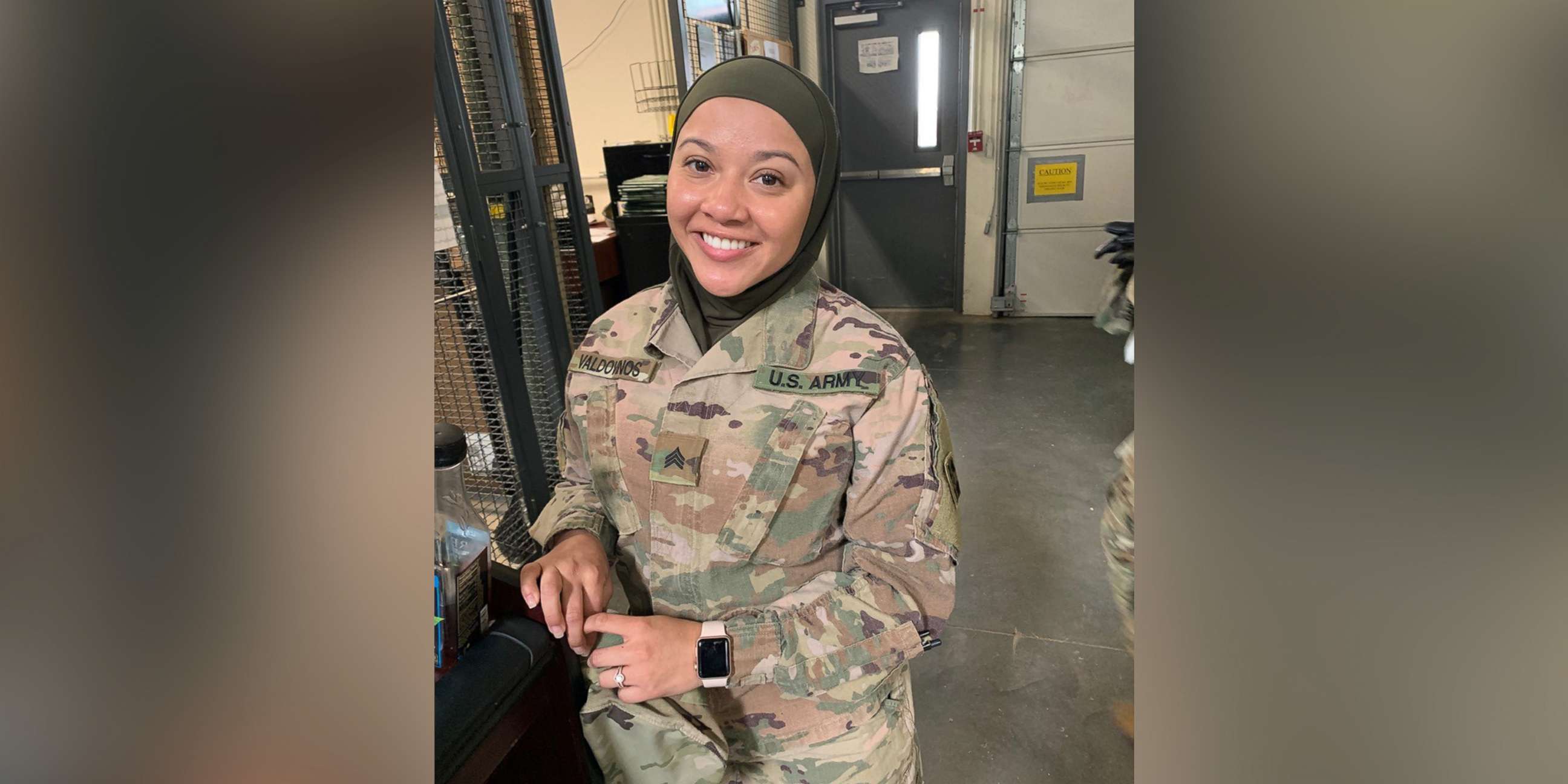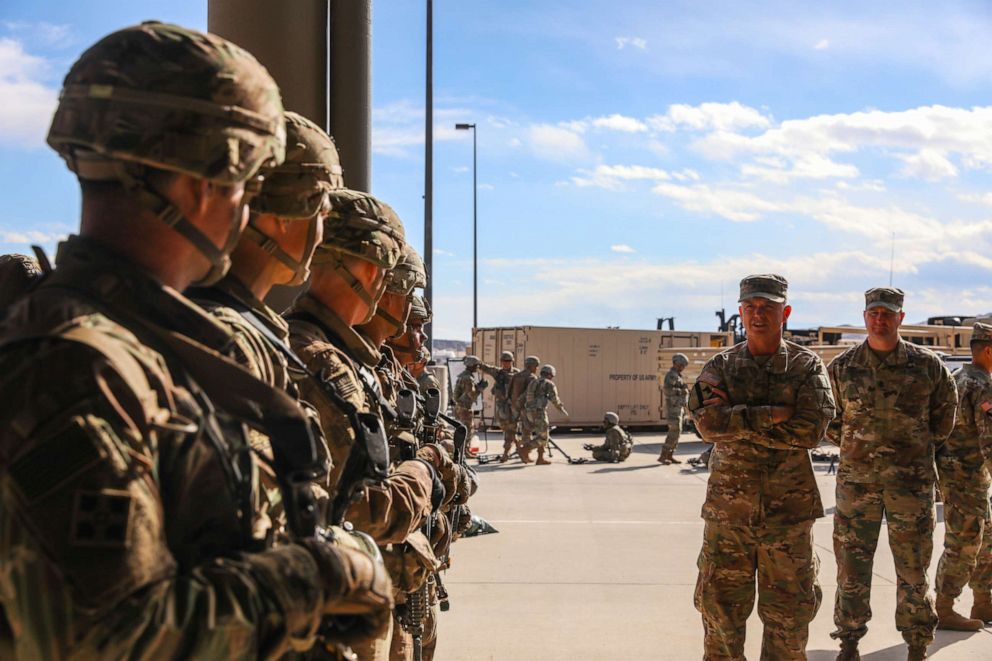A Muslim soldier plans to sue the Army over confrontations about her hijab
A confrontation took place over whether she was wearing her hair correctly.
Cesilia Valdovinos, a seven-year veteran of the Army, converted to Islam in 2016 and has worn her hijab ever since.
But instead of acceptance, she claims she has been subject to harassment both by her fellow soldiers and at least one superior.
Valdovinos says the problems began during her third deployment, when she was serving in Afghanistan last year. She said that she was called a terrorist, a member of ISIS, and a ninja “when I would wear my black hijab.” Her lawyer said that Valdovinos was called the “girl with the hood.”
The confrontations didn’t stop when she arrived back in the U.S., she claimed, and in the past month, she said that a superior told her to take off her hijab to prove that her hair was being kept according to Army regulations.
“It’s been a challenging experience,” Valdovinos, 26, told ABC News.
Adding to her concerns, she has been demoted from sergeant to specialist. While the Army said that was for an unrelated incident, Valdovinos believes that the punishment is related to her speaking out about her officer’s order to fix her hair under her hijab.
“Of course on paper they’re not connected, but I feel it was,” Valdovinos said.
Her lawyer, Mikey Weinstein, the founder and president of the Military Religious Freedom Foundation, told ABC that they plan to sue. He said that they are evaluating their options and working to determine whether they file a complaint with the U.S. Commission on Civil Rights or if they pursue a federal lawsuit in either Denver, where Valdovinos is based, or in Virginia, where the Pentagon is located.
“This is probably going to take some time, some period of probably weeks, to make sure that we fashion this dagger – this litigation dagger – effectively,” Weinstein said.
The Army honors religious accommodation requests, where individuals are allowed to wear religious items including hijabs or a Sikh turbans. Weinstein said that his client received such an accommodation from her brigade commander.
On March 8, Fort Carson officials released a statement saying that “according to sources who were present, Sgt. Valdovino’s hair was visibly out of regulation.”

“The senior NCO [non-commissioned officer] did ask the Soldier to remove her hijab in order to verify whether or not her hair was within regulation. Upon removing the hijab, the Soldier's leadership discovered that Sgt. Valdovinos' hair was completely down, which is not allowed while in uniform.
"The senior NCO told Sgt. Valdovinos to put her hair back in regulation and to not let it happen again. The Soldier was never told she could not wear the hijab,” the statement said.
Valdovinos told ABC News that she wears an undercap beneath her hijab, and that her bun came apart while taking it off.
Fort Carson officials confirmed in an April 1 statement that they received an equal opportunity complaint relating to the request to remove Valdovinos' hijab to check her hair, and allegations that she was called a terrorist and “the girl in the hood.”
Between the March 8 statement and the April 1 statement, Valdovinos was demoted to specialist.
“The inquiry concluded that the senior non-commissioned officer acted appropriately by enforcing the proper wear of the hijab, in compliance with Army Regulations,” Col. Dave Zinn, the commander 2nd Infantry Brigade Combat Team, 4th Infantry Division, said in a statement.
“Our leaders are committed to supporting Soldiers' freedom of religious expression. I have, and will continue to take all reports of Soldiers disrespecting religious beliefs, observances, or traditions very seriously. I will ensure our unit continues to place a high value on the rights of our Soldiers to observe the tenets of their respective religions or to observe no religion at all,” Zinn said.
“We value diversity within our ranks and will continue to embrace our differences, which make us a stronger more well-rounded team of cohesive, highly-trained Soldiers prepared to answer our Nation's call anytime, anywhere,” Zinn added.
Zinn also maintained her disciplinary action -- her demotion -- was not connected to her hijab.
“The Army has not taken any adverse actions against Spc. Valdovinos in response to the wear of any religious garment, her equal opportunity complaint, or the resulting media attention,” Zinn said in his statement.

Weinstein said that Valdovinos has been “accused of [having] an inappropriate relationships with another soldier,” but she denies any wrongdoing.
While they evaluate their legal options, Valdovinos is uneasy and wants to be transferred to another brigade.
“I don’t trust anybody in the military,” Valdovinos said.
“At the end of the day, I’m still an American. I’m still fighting for this country. I’ve lost several friends during deployments… so I bleed and hurt just like any American for the wars that are going on,” she said.




